Barnsley F.C.
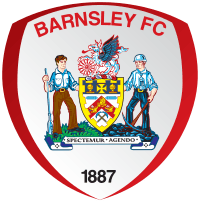 | |||
| Full name | Barnsley Football Club | ||
|---|---|---|---|
| Nickname(s) |
| ||
| Founded | 1887 | ||
| Ground | Oakwell | ||
| Capacity | 23,009[1] | ||
| Owner | Patrick Cryne | ||
| Chairman | Maurice Watkins | ||
| Manager | Paul Heckingbottom | ||
| League | Championship | ||
| 2015–16 | League One, 6th (promoted via play-offs) | ||
| Website | Club home page | ||
|
| |||
Barnsley Football Club is a professional association football club based in the town of Barnsley, South Yorkshire, England. The team play in the Championship, the second tier of the English football league system. Nicknamed "the Tykes", they were founded in 1887 by Reverend Tiverton Preedy under the name Barnsley St. Peter's. The club colours are red and white, and their home ground since 1888 has been Oakwell. In 2016, Barnsley won 2 Trophies at Wembley Stadium - the Football League Trophy, beating Oxford United 3–2 in the final, and the 2016 Football League play-offs, beating Millwall F.C. 3-1 in the final. Barnsley became the second club to secure both the Football League Trophy and Football League promotion via playoff finals in the same season, after Grimsby Town F.C..
History
Barnsley have spent more seasons in the second tier of English football than any other club in history[2] and have produced some notable talents over the years who have gone on to be successful at other clubs. One example is Tommy Taylor, who was a prolific goalscorer for Barnsley in the early 1950s and went on to win two league titles with Manchester United (as well as scoring 16 times in 19 England internationals) before losing his life in the Munich air disaster. Taylor's move to Manchester United was for a fee of £29,999 – one of the highest fees in England at the time. Taylor broke into the Barnsley team just after the sale of wing-half Danny Blanchflower to Aston Villa. Blanchflower would go on to sign for Tottenham Hotspur and be voted FWA Player of the Year twice as well as captaining the North London club to the first league and cup double of the 20th century.[3]
Beginnings and FA Cup glory
Barnsley FC was established in 1887 by a clergyman, Tiverton Preedy, and played in the Sheffield and District League from 1890 and then in the Midland League from 1895. They joined the Football League in 1898, and struggled in the Second Division for the first decade, due in part to ongoing financial difficulties. In 1910 the club reached the FA Cup final, where they lost out to Newcastle United in a replay match. However, they would then reach the 1912 FA Cup Final where they would defeat West Bromwich Albion 1–0 in a replay to win the trophy for the first and only time in their history.
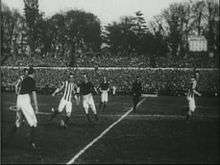
When the league restarted after World War I, the 1919–20 season brought some significant changes to the league. The principal difference was that the First Division would be increased from 20 teams to 22. The bottom team from the previous season was Tottenham Hotspur and they were duly relegated. The first extra place in the First Division went to Chelsea, who retained their place despite finishing 2nd bottom and therefore in the relegation places. Derby County and Preston North End were rightly promoted from the Second Division which left one place to be filled. Having finished the previous season's Second Division in 3rd place (1914–15), Barnsley expected to achieve First Division status for the first time, but The Football League instead chose to call a ballot of the clubs. Henry Norris, the then Arsenal chairman, had recently moved Woolwich Arsenal north of the River Thames to Highbury, and needed First Division football to attract fans to their new home. He was later to admit some underhand dealings, allegedly including the bribing of some member clubs to vote for Arsenal's inclusion. They duly won the vote and Barnsley were consigned to the second tier of English football for another 8 decades.
Prewar and postwar era
The club did however come close to reaching the top division in the early years. In 1922, they missed out on promotion by a single goal. During the years preceding and following World War II, the club found themselves sliding between the Second and Third Division.
In 1949 the club signed a 23-year-old wing-half called Danny Blanchflower from Glentoran, and he so impressed at Oakwell that two years later he was signed by First Division side Aston Villa, later signing for Tottenham Hotspur and being voted FWA Player of the Year twice, as well as being the captain of the 20th century's first league and cup double winning team in 1961.
Around the time of Blanchflower's departure, a young centre-forward called Tommy Taylor broke into the Barnsley team, scoring 26 goals in 44 games for Barnsley. In April 1953, he became one of the most expensive players in English football at the time when Matt Busby signed him for Manchester United for a fee of £29,999. Taylor went on to be a prolific goalscorer at the highest level over the next five years, winning two league titles and also scoring 16 times in 19 appearances for the England national football team, before losing his life in the Munich air disaster in February 1958.
Fourth Division era
When the Northern and Southern sections of the Third Division were replaced by national Third and Fourth Divisions for the 1958–59 season, Barnsley were still in the Second Division, but went down to the Third Division at the end of that season.
In 1965, Barnsley were relegated to the Football League Fourth Division for the first time, winning promotion three years later. They went down to the Fourth Division again in 1972, and this time stayed down for seven seasons, finally returning to the Third Division in 1979.
Revival in the 1980s
Two years later, they went up again and quickly established themselves as a decent Second Division side throughout the 1980s, although they still failed to clinch that elusive First Division place, despite the introduction of the playoffs in the second half of the decade, which gave teams finishing as low as fifth and eventually sixth the chance of winning promotion.
Division One and the Premier League
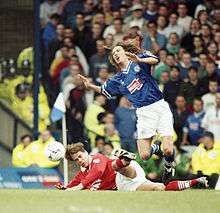
At the time of the creation of the FA Premier League in 1992, Barnsley had been Football League members for 94 years but had still not reached the top flight. They were, at least, in a decent position to make that breakthrough, as members of the new Division One (as the old Second Division was now called). In December 1989, they turned to Mel Machin, manager of Manchester City's promotion-winning side the previous campaign, to guide them into the top flight, but he left nearly four years later with promotion still to be achieved. Machin's successor Viv Anderson spent just one season in charge before quitting to become Bryan Robson's assistant at Middlesbrough, and for the 1994–95 season Barnsley turned to veteran midfielder Danny Wilson to manage the club.
Wilson's first season brought a sixth-place finish in Division One, which would normally have meant a playoff place, but a restructuring of the league meant that they missed out. They finished 10th a year later before finally emerging as serious promotion contenders in the 1996–97 season, finally clinching runners-up spot and automatic promotion and gaining the top flight place that they had spent 99 years trying to win.
Barnsley lasted just one season in the Premier League but did not go down without a brave fight, and they did reach the quarter-finals of the FA Cup, famously defeating Manchester United in the fifth round. Wilson then departed to take over at Sheffield Wednesday, being succeeded as Barnsley manager by veteran striker John Hendrie, who had been a key player in the promotion-winning team.
Barnsley were the only team from outside the Premier League to reach the quarter-finals of the FA Cup in the 1998–99 season, but had a disappointing season in Division One, never really looking like winning promotion and eventually finishing a dismal 13th in the final table. Hendrie was then replaced as manager by Dave Bassett, who rejuvenated the team and took them to fourth place in 1999–2000, but they lost in the playoff final to Ipswich Town.
Mixed fortunes in the 21st century
In the following years Barnsley were not as successful, with relegation to Division Two in 2002 and administration both threatening the existence of the club. Barnsley suffered greatly due to the ITV Digital crisis. A late purchase by Barnsley's then Mayor, Peter Doyle, saved the club from folding. Doyle has since left the club, leaving Gordon Shepherd and local businessman Patrick Cryne in control. A regular turnover of managers did the club's stability no favours, either.
Barnsley had the distinction of playing in the last play-off final at Wembley before the stadium was closed for redevelopment,[4] and in 2006 won in a play-off final at the Millennium Stadium in Cardiff, where they beat Swansea City 4–3 on penalties (2–2 after extra-time) to earn promotion to the Championship. The manager at this time was Andy Ritchie, who was in his first season in charge after replacing Paul Hart.
The team struggled in their first season back in the Championship. In November 2006, with Barnsley in the relegation zone, Ritchie was sacked in favour of Simon Davey. Davey managed to steer the team away from relegation in the second half of the season, and the eventually finished 20th. The following season, a much-changed Barnsley side managed a historic FA Cup run, beating Premier League giants Liverpool 2–1 at Anfield and defending champions Chelsea 1–0 to reach the semi-finals for the first time since 1912, where they narrowly lost out 1–0 to fellow Championship side Cardiff City at Wembley.
Barnsley narrowly avoided relegation from the Championship that season, and after a disappointing start to the 2009–10 season Simon Davey. was sacked in favour of former Rotherham United boss Mark Robins.[5]
In May 2011, after a difficult 2010–11 season, Robins resigned as manager due to a dispute over the budget for the following season.[6] He was replaced by Rochdale manager Keith Hill and his assistant David Flitcroft.[7] Barnsley ended the 2011–12 season as one of only two football clubs to turn a profit in the Championship; ironically they stayed up only because Portsmouth were given a 10-point deduction for going into administration. The club's form failed to improve the following season, and Keith Hill was sacked as manager shortly before the turn of the year. David Flitcroft took over initially as caretaker manager, and after an improved run of results (combined with Sean O'Driscoll and Terry Butcher turning down the chance to manage the club) earned the job on a permanent basis.[8]
On Sunday 3 April 2016, Barnsley won the Football League Trophy after a 3–2 win over Oxford United of League Two at Wembley.[9]
On 19 May, after a 6–1 aggregate win over Walsall, Barnsley booked their place in the Play Off Final.[10] On 29 May, they gained promotion back to the Football League Championship with a 3–1 win over Millwall at Wembley.[11]
Current season
In September 2016, Barnsley were caught up in an ongoing scandal in English football, with assistant manager Tommy Wright alleged to have accepted "bungs" in exchange for working as an ambassador for a third-party player ownership consortium. Wright was initially suspended before being sacked by Barnsley on 28 September.[12]
Timeline
1887-Founded by Reverend Tiverton Preedy
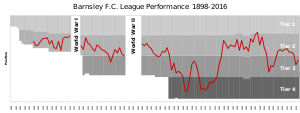
- 1892–93 – Founder member of Sheffield League, as "Barnsley St. Peter's"
- 1893–94 – Sheffield League Division Two runner-up
- 1895–96 – Joined Midland League
- 1897 – Dropped "St Peter's" to become simply Barnsley
- 1897–98 – Midland League runner-up. Also played in Yorkshire League
- 1898 – Elected to the Football League
- 1909–10 – FA Cup runner-up
- 1911–12 – FA Cup Winners
- 1921–22 – Missed promotion on goal average
- 1932 – Relegated to Division Three North
- 1933–34 – Football League Division Three North Champions; promoted to Division Two
- 1938 – Relegated to Division Three North
- 1938–39 – Football League Division Three North Champions; promoted to Division Two
- 1939–40 – Football League programme abandoned due to outbreak of war
- 1953 – Relegated to Division Three North
- 1953–54 – Football League Division Three North runner-up
- 1954–55 – Football League Division Three North Champions; promoted to Division Two
- 1959 – Relegated to Division Three
- 1965 – Relegated to Division Four
- 1967–68 – Football League Division Four runner-up; promoted to Division Three
- 1972 – Relegated to Division Four
- 1978–79 – Missed runner-up spot on goal difference; promoted to Division Three
- 1980–81 – Football League Division Three runner-up (on goal difference); promoted to Division Two
- 1990–91 – Missed play-off spot on goal difference
- 1992–93 – Division Two re-designated Division One on formation of FA Premier League
- 1996–97 – Football League runner-up; promoted to FA Premier League
- 1997–98 – Relegated to Football League Division One
- 1999–00 – Not promoted after play-offs. Finished 4th in the final table (Semi-final – Birmingham City 0 Barnsley 4, Barnsley 1 Birmingham City 2, Agg 5–2; Final – Barnsley 2 Ipswich Town 4 at Wembley)
- 2002 – Relegated to Division Two
- 2004–05 – Division Two re-designated Football League One on formation of Football League Championship
- 2005–06 – Promoted as Football League One play-off winners. Finished 5th in the final table. (Semi-final – Barnsley 0 Huddersfield Town 1, Huddersfield Town 1 Barnsley 3, Agg 3–2. Final – Swansea City 2 Barnsley 2 (AET). Barnsley win 4–3 on penalties at the Millennium Stadium, Cardiff.)
- 2007–08 – FA Cup Semi-finalists (Defeated Blackpool 2–1 Goals by Stephen Foster and Michael Coulson, Defeated Southend United 1–0 Goal by Jamal Campbell-Ryce, Defeated Liverpool 2–1 Goals by Stephen Foster and Brian Howard, Defeated Chelsea 1–0 Goal by Kayode Odejayi, Lost to Cardiff City 1–0 in the semi-final)
- 2008–09 – Fielded the youngest ever player in the history of the Football League at Ipswich Town when Reuben Noble-Lazarus came on aged 15 years and 45 days
- 2013–14 - Relegated to League One after a 3–1 defeat at Middlesbrough
- 2015-16 – Football League Trophy Champions after a 3–2 win against Oxford United in the final at Wembley Stadium.
- 2015-16Promoted to Football League Championship through the 2016 Football League play-offs after finishing 6th in Football League One. Defeated Walsall in the semi finals, winning 6-1 on aggregate after 3-0 first leg win and 3-1 second leg win. Defeated Millwall 3-1 in the final at Wembley Stadium.
Overall
- Seasons spent at Level 1 of the football league system: 1
- Seasons spent at Level 2 of the football league system: 76
- Seasons spent at Level 3 of the football league system: 20
- Seasons spent at Level 4 of the football league system: 10
Barnsley have spent more seasons at the second level of English football than any other team and on 3 January 2011 became the first club to achieve 1,000 wins in the second level of English football with a 2–1 home victory over Coventry City. Barnsley are also the first club to play 3,000 games in second-level league football (W1028, D747, L1224).[13]
Stadium
The name, Oakwell, originates from the well and oak tree that were on the stadium site when first built. Oakwell is a multi-purpose sports development in Barnsley, South Yorkshire, used primarily by Barnsley Football Club for playing their home fixtures, and their reserves. While the name 'Oakwell' generally refers to the main stadium, it also includes several neighbouring venues which form the facilities of the Barnsley F.C. academy – an indoor training pitch, a smaller stadium with seating on the south and west sides for around 2,200 spectators, and several training pitches used by the different Barnsley FC squads. Until 2003 the stadium and the vast amount of land that surrounds it was owned by Barnsley Football Club themselves; however, after falling into administration in 2002 the council purchased the main Oakwell Stadium to allow the club to pay its creditors and remain participants in The Football League.
Colours and strip
Kit manufacturers and shirt sponsors
| Period | Kit manufacturer | Shirt sponsor |
|---|---|---|
| 1976–1977 | Litesome | — |
| 1977–1979 | Admiral | |
| 1979–1980 | Umbro | |
| 1980–1981 | Taits | |
| 1981–1984 | Haysdelen | |
| 1984–1986 | Brooklands Hotel | |
| 1986–1988 | Lowfields | Sandal Bayern |
| 1988–1989 | Intersport | Lyons Cakes |
| 1989–1991 | Beaver International | Shaw Carpets |
| 1991–1993 | Gola | Hayselden |
| 1993–1994 | Pelada | |
| 1994–1995 | ORA | |
| 1995–2000 | Admiral | |
| 2000–2001 | Big Thing | |
| 2001–2002 | iSoft | |
| 2002–2003 | Red Flag | |
| 2003–2004 | Vodka Kick | |
| 2004–2005 | Koala | |
| 2005–2007 | Jako | Barnsley Building Society |
| 2007–2008 | Surridge | Wake Smith |
| 2008–2011 | Lotto | Barnsley Building Society |
| 2011–2014 | Nike | C.K. Beckett |
| 2014–2015 | Avec | |
| 2015–2016 | Puma | |
| 2016– |
Home strip
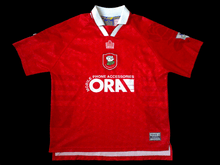
Barnsley have played their home games in red shirts for most of their history. The only exception to this is the period 1887–1901, where it is speculated that the team first wore blue shirts with purple/claret arms, then circa 1890 the team wore chocolate and white stripes, before moving on to blue and white stripes around 1898. The team first wore their now traditional red shirts in 1901.[14]
Since this time, the team has worn red shirts often with a white trim. In more recent times a black trim has sometimes been used. As with most football clubs the shirt design varies from season to season. One particular design that stands out is the 1989–90 season shirt which featured white stars on a red background and has been named as one of the worst shirts ever.[15] However, the kit is fondly remembered by some fans. Sponsors names and logos were first worn in the 1980–81 season and the club has had 12 different sponsors on the shirt in total. Since manufacturers logos were added to the shirt in the 1976–77 season, the club has 12 different kit manufacturers.
Traditionally, the team has worn white shorts (sometimes with red and/or black trim) for their home games with the only recent exceptions coming in the early years of the 20th century. One other notable exception came in the 2000 Division One Playoff Final against Ipswich Town, where the team wore red shorts, thus having an all-red strip.[16] The Reds have also worn red shorts in their 1988–89 season.
Apart from the club's early years and the period 1921–1934 where the team wore black, the team has worn red and/or white socks for its home games. Again, the design changes from season to season.
For 2010–11 the kit was the traditional red, with white trim. It featured a shield style club badge to the left, with kit sponsors Lotto's logo on the opposite side. The main design was the Barnsley Building Society eagle logo, a return to the design from 2006–07.
In the 2015–16 Play Off Final, Barnsley wore the new home kit for the 2016–17 season, but with black shorts.
Away strip
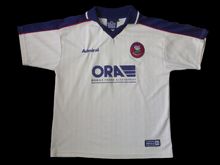
The club's away strip (used for away or cup fixtures where there is a clash of colours) differs from season to season but usually follows the design of the season's home strip with a variation on the colours. The most common colour for the away shirt has been white but many others have been used, including blue, yellow, black, ecru, dark green and even black and blue stripes. One notable away strip was the 2001–02 "Its just like watching Brazil" kit, where the team wore the colours of the 5-time World Cup winners Brazil for their away games.
Current strip
The current strip is manufactured by Puma and the main sponsor is CK Beckett with a rear shirt sponsor of Palmer Construction LTD. The shorts sponsor is BAPP for Bolts.
The home shirt is the traditional red, with a white Puma logo and club badge on the chest area. There is a white Puma logo on each shoulder. The shorts are all white with a red Puma logo and club badge on the front. The socks are red and white hooped with a Puma logo on the knee/shin area. The socks of the upcoming 2016-17 season are very much like the socks that Barnsley wore when they were promoted to the Premier League.
The away shirt is navy blue, with a gold Puma logo and club badge on the chest area. There is a gold Puma logo on each shoulder. The shorts are all navy blue with a gold Puma logo and club badge on the front. The socks are navy blue, with a gold stripe at either side, front and back. There is a gold Puma logo on the knee/shin area. The letters 'BFC' are woven into the calf area of both socks, in gold.
Squad
- As of 24 September 2016.[17]
First-Team squad
Note: Flags indicate national team as defined under FIFA eligibility rules. Players may hold more than one non-FIFA nationality.
|
|
On loan
Note: Flags indicate national team as defined under FIFA eligibility rules. Players may hold more than one non-FIFA nationality.
|
Development Squad
Note: Flags indicate national team as defined under FIFA eligibility rules. Players may hold more than one non-FIFA nationality.
|
|
U18 Squad
Note: Flags indicate national team as defined under FIFA eligibility rules. Players may hold more than one non-FIFA nationality.
|
|
Staff
Board
- Owner – Patrick Cryne
- Chairman – Maurice Watkins CBE
- Honorary Life President – Barry Taylor
- Director – Barry Taylor
- Chief Executive – Linton Brown
Coaching staff
- Head Coach – Paul Heckingbottom
- First Team Coach – Jamie Clapham
- Goalkeeper Coach – John Vaughan
- Team Doctor - Dr John Harban
- Head Physiotherapist – Craig Sedgwick
- Physiotherapist – Vikki Stevens
- Physiotherapist – Ruth Titteron
- Head of Sports Science – Nathan Winder
- Kitman – Malcom Mitchell
- Analyst – Alex Bailey
- Head of Academy Coaching - Mark Burton
- Academy Coach - Martin Devaney
- Academy Coach - Chris Howarth
Club staff
- Head of Academy Recruitment – Bobby Hassell
- Club Secretary – Sharon Hardware
- Commercial Manager – Ian Leech
- Marketing Manager – Rob Davies
Managers
| Barnsley F.C. managers from 1898 to present | ||
|---|---|---|
|
|
|
Club records
- Record League Victory: 9–0 v Loughborough Town, Second Division, 28 January 1899
- Record Cup Victory: 6–0 v Blackpool, FA Cup First round, 20 January 1910
- Record League Defeat: 0–9 v Notts County, Second Division, 19 January 1927
- Record Cup Defeat: 1–8 v Derby County, FA Cup First round, 30 January 1897
- Highest League Scorer in Season: Cecil McCormack, 33, 1950–51
- Most League Goals in Total Aggregate: Ernie Hine, 131[18]
- Most Internationals Caps: Gerry Taggart, 35, Northern Ireland
- Most League Appearances: Barry Murphy, 514, 1962–78
- Record Transfer Fee Received: £5,000,000 from Swansea City for Alfie Mawson, August 2016
- Record Transfer Fee Paid: £1,500,000 to Partizan Belgrade for Gorgi Hristov (1997) and £1,500,000 to QPR for Mike Sheron (1999)
- Record Attendance: 40,255 v Stoke City, FA Cup 5th round, 15 February 1936
- Youngest ever Football League player: Reuben Noble-Lazarus 15 years and 45 days[19]
- Oldest player: Mike Pollitt 41 years, 5 months and 30 days[20]
- Most Goals scored in a single Game: Craig Davies 4 vs Birmingham City F.C. Away, 0–5
References
- ↑ "Barnsley Football Ground Guide". The Internet Football Ground Guide. Retrieved 1 February 2012.
- ↑ "Second Tier Historical Stats". Football365.com. Archived from the original on 23 January 2009. Retrieved 31 December 2009.
- ↑ "Tommy Taylor – Gone but still not forgotten". Yorkshire Post Online. 12 January 2008.
- ↑ "Play-off joy at last for Burley's Ipswich". BBC Sport. 29 June 2000.
- ↑ "Robins confirmed as Barnsley boss". BBC Sport. 9 September 2009. Retrieved 8 November 2013.
- ↑ "Mark Robins resigns as Barnsley manager". BBC Sport. 15 May 2011. Retrieved 8 November 2013.
- ↑ "Barnsley appoint Rochdale boss Keith Hill as manager". BBC Sport. 1 June 2011.
- ↑ "Barnsley appoint David Flitcroft manager after Leeds win". BBC Sport. 13 January 2013. Retrieved 8 November 2013.
- ↑ Cartwright, Phil (3 April 2016). "Barnsley 3 Oxford United 2". BBC Sport. Retrieved 4 April 2016.
- ↑ Scott, Ged. "Walsall 1–3 Barnsley (1–6 agg)". BBC Sport. Retrieved 25 May 2016.
- ↑ Stevens, Rob. "Barnsley 3-1 Millwall". BBC Sport. Retrieved 2016-06-01.
- ↑ "How Barnsley assistant manager Tommy Wright took £5k bung to help agents place players at his club - then took part in bizarre meeting".
- ↑ "Barnsley 2–1 Brighton". BBC Sport. 12 March 2013. Retrieved 8 November 2013.
- ↑ "Barnsley – Historical Football Kits". Historical Kits. Archived from the original on 5 September 2007. Retrieved 4 September 2007.
- ↑ "Room 101- The Worst Football Kits Ever". Historical Kits. Archived from the original on 20 August 2007. Retrieved 4 September 2007.
- ↑ "Stewart pays tribute to keeper Wright". BBC Sport. 29 May 2000. Retrieved 4 September 2007.
- ↑ "Barnsley FC Player Profiles". Barnsley F.C. Retrieved 4 January 2016.
- ↑ {{barnsleyfc.co.uk>, 1921–26 & 34–38}}
- ↑ "Barnsley schoolboy makes history". BBC Sport. 1 October 2008. Retrieved 3 September 2010.
- ↑ "Reds hit for five by Saints". Barnsley Chronicle. 27 August 2013. Retrieved 28 August 2013.
External links
| Wikimedia Commons has media related to Barnsley F.C.. |
- Official website
- Barnsley F.C. on BBC Sport: Club news – Recent results – Upcoming fixtures
- Barnsley at ScoreShelf
- Barnsley FC at the Barnsley Chronicle
- Barnsley FC Supporters Trust
- BBC South Yorkshire's Barnsley FC Page
- Barnsley Statistics at Football365
- Independent Barnsley FC News – barnsleyfc.com
- Barnsley FC News at NewsNow